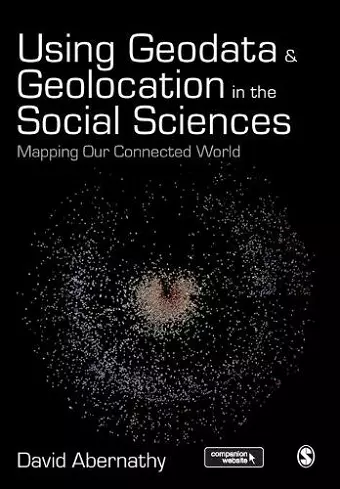Using Geodata and Geolocation in the Social Sciences
Mapping our Connected World
Format:Paperback
Publisher:Sage Publications Ltd
Published:2nd Nov '16
Currently unavailable, and unfortunately no date known when it will be back
This paperback is available in another edition too:
- Hardback£129.00(9781473908178)

"Abernathy provides a truly accessible and interdisciplinary introduction to geodata and geolocation covering both the conceptual and the practical. It is a must read for students or researchers looking to make the most of the spatial elements of their data" - Luke Sloan, Senior Lecturer in Quantitative Methods, Cardiff University
Using Geodata and Geolocation in the Social Sciences: Mapping our Connected World provides an engaging and accessible introduction to the Geoweb with clear, step-by-step guides for:
- Capturing Geodata from sources including GPS, sensor networks and Twitter
- Visualizing Geodata using programmes including QGIS, GRASS and R
Featuring colour images, practical exercises walking you through using data sources, and a companion website packed with resources, this book is the perfect guide for students and teachers looking to incorporate location-based data into their social science research.
It will provide students and researchers in social science and humanities with a solid foundation for handling quantitative data from
the geoweb. -- Stefano De Sabbata,
Having an understanding of geography is essential for scholars across all the disciplines in the Social Sciences following the data revolution, the rise of ′big data′ and the increasing salience of utilising naturally occurring data as a way of augmenting our understanding of how we interact in the social world. In response to this, Abernathy provides a truly accessible and interdisciplinary introduction to geodata and geolocation covering both the conceptual and the practical. It is a must read for students or researchers looking to make the most of the spatial elements of their data.
-- Luke SloanThis book provide an insightful perspective on the geoweb, exploring a diverse range of applied geodata examples. Applications tackle interesting and current data issues, such as crowdsourced geographic data and harvesting geolocated social media information for assisting geospatial decision-making. This allows for relatively technical concepts to be highly accessible to the reader. The work-through examples link effectively to geostatistical analysis of data providing an excellent basis for communicating fundamental notions of the geoweb to students. This book provides a great primer for better understanding geolocated information.
-- Eloise BiggsUsing Geodata and Geolocation in the Social Sciences" is a much-needed text book for anyone interested in understanding what the geoweb is, how it works and how it is shaping our interactions with places, people and objects. This very well-written book provides a clear overview of the historical, technological and intellectual foundations of the geoweb. It fills a gap in academic literature by combining the practical aspects of collecting, processing and visualizing a range of geodata with a more critical perspective on the economic, social and political implications the geoweb is having on our daily lives.
-- Sébastien Caquard
David Abernathy recognizes that, regardless of our participation in the geoweb, we increasingly live our lives within it. This important text begins from such a premise, that in order to intervene and make change in the geoweb, we must understand its situation — its context — while also experimenting with the techniques and technologies that make its proliferation possible. Organized into two parts, this book charts our cyborgian world, giving readers access to the fantastic histories of our geoweb present and the concepts necessary to build expertise in their use. Technologies and concepts in the geospatial sciences have undergone rapid change. Abernathy captures a moment in this dynamism, and provides readers with key handles into this phenomenon from the perspective of the social sciences. Far from simply a technical handbook on the geoweb, this book enables a more critical understanding of the issues associated with the proliferation of the geoweb in everyday life, for some, as well as the implications of the uneven access to such surveillant innovations.
-- Matthew W. WilsonThis book provides an engaging and accessible introduction to the Geoweb, with clear, step-by-step guides for capturing Geodata from sources including GPS, sensor networks and Twitter. The perfect guide for students and teachers looking to incorporate location based data into their social science research. -- Mike Robinson
The balance between theory and technical instructions is good and the book will encourage students and researchers to explore more available tools to create and communicate spatial data. -- Ran Goldblatt
ISBN: 9781473908185
Dimensions: unknown
Weight: 640g
344 pages